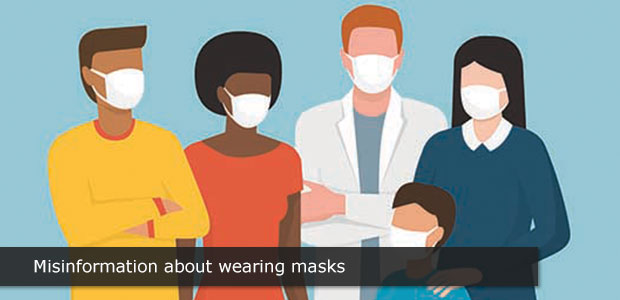
Wearing a mask is a proven way to help reduce and prevent the spread of COVID-19. But even now, there is a great deal of misinformation circulating about masks and their safety and effectiveness. Here are some of the myths about mask use, along with the facts.
Myth: Surgical or non-medical masks aren’t truly masks. To be a mask it should have engineered breathing openings that allow for the free flow of air when people inhale or exhale.
Fact: Surgical and non-medical masks are masks – protective face coverings that help capture your respiratory particles and prevent exposure to the infectious respiratory particles of others. These masks are not intended to seal airtight against the face.
Respirator masks, such as N95s, do have a proper seal on the user’s face and force inhaled air to be pulled through the respirator’s filter material to provide protection. It should be noted that masks with exhalation valves are specifically not recommended because they allow infectious respiratory particles to spread outside the mask. They don’t provide protection to others.
Myth: The use of surgical or non-medical masks is dangerous to health because the masks trap exhaled carbon dioxide and reduces oxygen.
Facts: As noted, these masks are not designed to cause a tight seal. And the science shows that wearing a mask does not affect our lung function or oxygen levels, or cause a buildup of carbon dioxide. There is also the obvious fact that physicians and other healthcare staff routinely wear masks for extended periods, with no ill effects.
Concerns have also been raised about how children may be affected by wearing masks, but studies have found no respiratory impact on children from wearing masks, though mask use may not be recommended for children with certain conditions.
Myth: Masks trap heat and moisture and serve as a breeding ground for bacteria.
Facts: The masks in use are either single-use disposable items or are reusable items that should be washed daily when used. There is no evidence to suggest facemasks increase the chance of developing pneumonia or other infections as long as masks are kept clean and used properly. Anti-bacterial masks are also available for individuals with particular concerns but are not necessary, nor recommended, for general use.
A related contention is that the heat and moisture associated with wearing the mask will cause them to degrade, causing people to breathe in chemicals and fibres from the mask. However, surgical masks are regulated by Health Canada to ensure their safety. Non-medical masks are generally made of cloth that is unlikely to degrade from regular wear or cleaning. Individuals should dispose of a mask if it is damaged in any way.
Myth: Masks don’t actually work to prevent the spread of COVID-19 and are incapable of stopping viral transmission.
Fact: The use of masks to reduce the emission of respiratory particles – source control – has been part of medical science for years.
With COVID-19, masks are effective at blocking most large droplets, but can also block the exhalation of fine droplets and particles. They can also help prevent the inhalation of these respiratory particles. Furthermore, numerous studies have demonstrated that mask use has been effective in reducing the risk of transmission and reducing the spread of COVID-19.
One final reminder – wearing masks is just one action people should take to limit the spread of COVID-19 to go along with physical distancing, hand hygiene, and staying home when you are sick. Vacccination remains the most powerful protection against COVID-19.
Add your comment